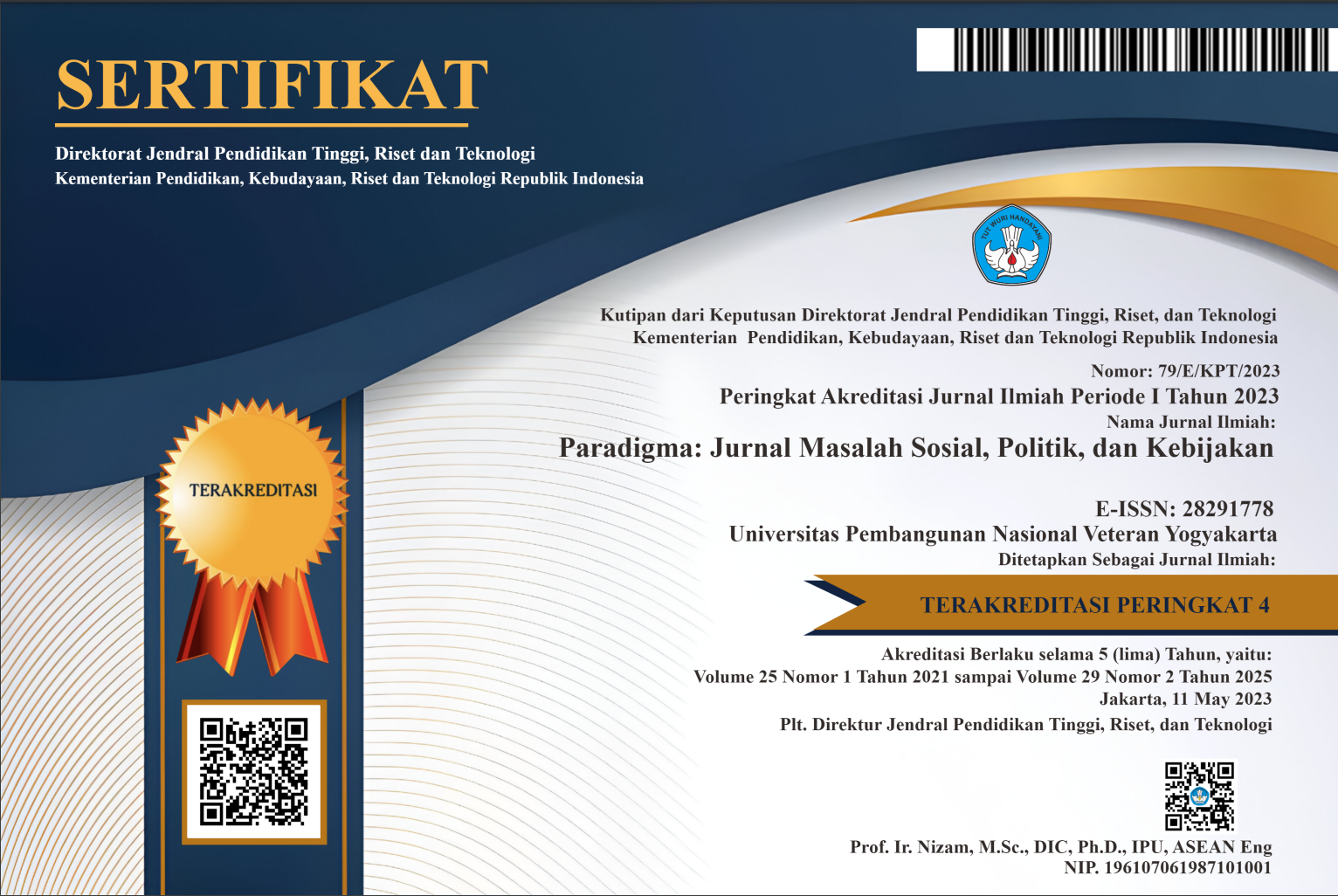Fashion Ekologis di Yogyakarta: Membangun Brand Awareness melalui Keterkaitan Diri dan Produk
Abstract
This study delves into the brand communication strategy and the implementation of sustainability values in the small and medium-sized fashion enterprise (SME), Lori Lurik, highlighting its success in amalgamating brand identity, sustainability, and communication strategies to foster personal and emotional connections with its consumers. Grounded in the Self-congruity Theory and the Message Planning Model, Lori Lurik consistently opts for handwoven lurik fabric as its primary material, reflecting local and cultural values. Following the principles of self-congruity, Lori Lurik successfully builds brand awareness through compelling narratives on Instagram and engaging consumers in interactive quizzes. Design innovations, such as the distinctive asymmetrical features, provide differentiation in the competitive fashion industry. The utilization of leftover production materials and a zero-waste packaging strategy underscores the commitment to sustainability, while challenges in leveraging influencers serve as crucial considerations for enhancing brand awareness. This research contributes practical insights for similar SMEs, emphasizing the importance of integrating sustainability values and communication strategies to strengthen brand images in dynamic markets.
Keywords
Full Text:
PDF (Bahasa Indonesia)References
Aaker, Alexander David. 2012. Building Strong Brands. New York: The Free Press.
Bajari, Atwar. 2022. Perencanaan Pesan Dan Media. Bandung: Universitas Padjajaran.
Berger, Charles R. 2015. “Planning Theory.” In The International Encyclopedia of Interpersonal Communication, Wiley, 1–9.
Defitri, Mita. 2022. “Sustainable Fashion Brand Di Indonesia.” https://waste4change.com/blog/brand-tekstil-sustainable-di-indonesia/.
Erianti, Vivi Dwi. 2023. “Peran Self-Congruity Dan Brand Image Dalam Memediasi Pengaruh Brand Personality Terhadap Brand Love (Studi Pada Konsumen Coffeeshop Praketa Purwokerto).” Thesis. Universitas Jenderal Soedirman.
Junaedi, Didi. 2019. “The Influence Od Self-Congruity and Mobile Marketing on Brand Loyalty at Fast Food Restaurants California Chicken in Subang City.” Diskursus Ilmu Manajemen STIESA (Dimensia) 16(2). www.topbrand-award.com.
Kang, Juhee, Liang Tang, and Ju Yup Lee. 2013. “Self-Congruity and Functional Congruity in Brand Loyalty.” Journal of Hospitality & Tourism Research 39(1): 105–31.
Kozlowski, Bardecki, and Searcy. 2019. “Tools for Sustainable Fashion Design: An Analysis of Their Fitness for Purpose.” Sustainability 11(13): 3581.
Kulsum, Umi. 2020. “Sustainable Fashion as The Early Awakening of the Clothing Industry Post Corona Pandemic A R T I C L E I N F O Umi Kulsum 1 / Sustainable Fashion Awal Kebangkitan Industri Busana Pasca Pandemi Corona.” International Journal of Social Science and Business 4(3): 422–29. https://ejournal.undiksha.ac.id/index.php/IJSSB/index.
Moleong, Lexy J. 2018. Metodologi Penelitian Kualitatif / Penulis, Prof. DR. Lexy J. Moleong, M.A. Cetakan ke-38. Bandung: PT Remaja Rosdakarya,.
P. Smith. 2022. Sustainable Fashion Worldwide - Statistics & Facts.
Pramarsudhi, Savitri Abshari, Riky Azharyandi Siswanto, and Ganjar Gumilar. 2021. “Perancangan Identitas Visual Dan Media Promosi Gerakan Sosial Sustainable Fashion Di Indonesia Visual Identity Design and Promotional Media of Indonesia’s Sustainable Fashion Movement.” In Bandung.
Rijali, Ahmad. 2019. “Analisis Data Kualitatif.” Alhadharah: Jurnal Ilmu Dakwah 17(33): 81.
Ruiz, Arabella. 2023. “47 Official Sustainable Fashion Statistics.” https://theroundup.org/sustainable-fashion-statistics/.
Sirgy, M. Joseph. 2018. “Self-Congruity Theory in Consumer Behavior: A Little History.” Journal of Global Scholars of Marketing Science 28(2): 197–207.
Sirgy, M.Joseph. 1985. “Using Self-Congruity and Ideal Congruity to Predict Purchase Motivation.” Journal of Business Research 13(3): 195–206.
Sutantio, Maradita. 2021. “Fashion Sebagai Perlawanan Dan Media Komunikasi.” JURNAL RUPA 5(2): 74.
WCED. 1987. World Commission on Environment and Development. Berlin.
Widjaja, Wachidin. 2009. Pengaruh Self-Congruity Terhadap Brand Loyalty Pada Pengguna Telepon Genggam Nokia Elny Widjaja (Marketing Manager, PT. Sony Indonesia, Broadcast and Professional Products Division).
Zafar, Md et al. 2015. “Sustainable and Ethical Fashion: The Environmental and Morality Issues.” IOSR Journal Of Humanities And Social Science (IOSR-JHSS 20(8): 17. www.iosrjournals.org.
DOI: https://doi.org/10.31315/paradigma.v28i1.11422
Refbacks
- There are currently no refbacks.
Copyright (c) 2024 Ayu Rachmahwati

This work is licensed under a Creative Commons Attribution-ShareAlike 4.0 International License.
Paradigma: Jurnal Masalah Sosial, Politik, dan Kebijakan
Published by Faculty of Social Science and Political Science
Universitas Pembangunan Nasional "Veteran" Yogyakarta
(Kampus Unit II) Jl. Babarsari 2, Tambakbayan, Depok, Yogyakarta 55281
Phone: +62 274 486733. Email: paradigma@upnyk.ac.id

This work is licensed under a Creative Commons Attribution-ShareAlike 4.0 International License.


